Electronic Data Interchange (EDI) is the widely accepted standard used by commercial partners for sending and receiving data in the electronic age. BizTalk Server provides EDI capabilities in its design through, among other things, receiving and sending pipelines that can be used expressly for this function. Let’s examine the EDI functionality in more detail.
The term “EDI,” which stands for “Electronic Data Interchange,” describes a situation in which two parties agree to exchange information electronically and in a format that both sides can understand. Businesses with various hardware and software setups can commonly exchange data through a standard data structure called EDI. A supply chain often uses EDI to exchange a range of information.
For example, your ERP system houses all your business data, including information about purchases, inventory levels, billing and invoicing, shipping, and other topics. Using EDI solutions along with your ERP system, you may access and use the data required to produce the messages to conduct business with other organizations.
For the supplier to fulfill submitted orders, EDI employs the standard of data (ANSI or EDIFACT) to verify that requests from one party are compatible with the supplier’s information system.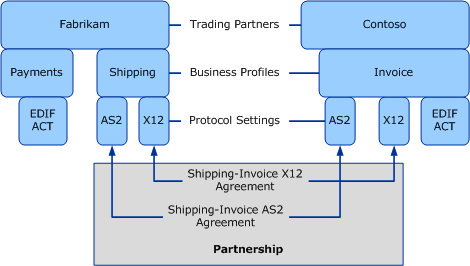
The EDI data for the different transactions are sent as a batch of delineated documents, and each of the delineated documents is encoded by stringent formatting guidelines to make sure the application receiving the documents can successfully parse and consume the data for downstream processing. Existing systems communicate EDI data while parsing and processing the EDI messages, including the formatting guidelines or schemas in each defined document.
Electronic Data Interchange (EDI) is the generally accepted format commercial partners use when sending and receiving data in the electronic age. BizTalk Server provides EDI capabilities in its design through receive and send pipelines that can be used expressly for this purpose.
Both your clients and your suppliers have standards for how they conduct business. Things like Ship-to addresses, special pricing, and other factors decided upon when a deal is made must be considered when transactions are conducted. EDI systems leverage this information to help firms trade more efficiently.
Several steps are needed to conduct a traditional B2B transaction, such as a purchase order, sales order, invoice, advance ship notice, or functional acknowledgment. Many paper documents are used in processing these transactions, and much human interaction is involved, which increases the likelihood of human error. But using EDI reduces human intervention and eliminates the need for paper documents.
Using EDI, businesses can automate data transfer among software programs throughout a supply chain. This approach ensures the timely delivery of business-critical data. Let’s look at a few of these advantages to gain a better understanding of them:
The notion of a Party is central to EDI. A party serves as a representation of a specific team within an organization or business partner. Parties’ profiles and agreements specify EDI/AS2 parameters and their interaction. Agreements between two company entities to exchange EDI messages using a particular message encoding protocol or a particular transport protocol are known as Trading Partner Agreements.
In B2B (Business-to-Business) communications, the parties involved are trading partners. An Agreement is used to describe a partnership between two people. The defined agreement is protocol- or transport-specific and is based on the communication the two partners hope to establish.
These agreements between different business profiles may occur frequently. For instance, an agreement to use the EDIFACT message encoding standard may exist between the “Payments” and “Invoice” profiles. A partnership between two trading partners is created by these agreements for each respective profile.
Setting up a BizTalk party and two agreements will allow you to determine how to handle EDI data that is sent over AS2. AS2 messaging is covered by one agreement (the “transport agreement”) and dealing with genuine EDI data is covered by another (encoding agreement).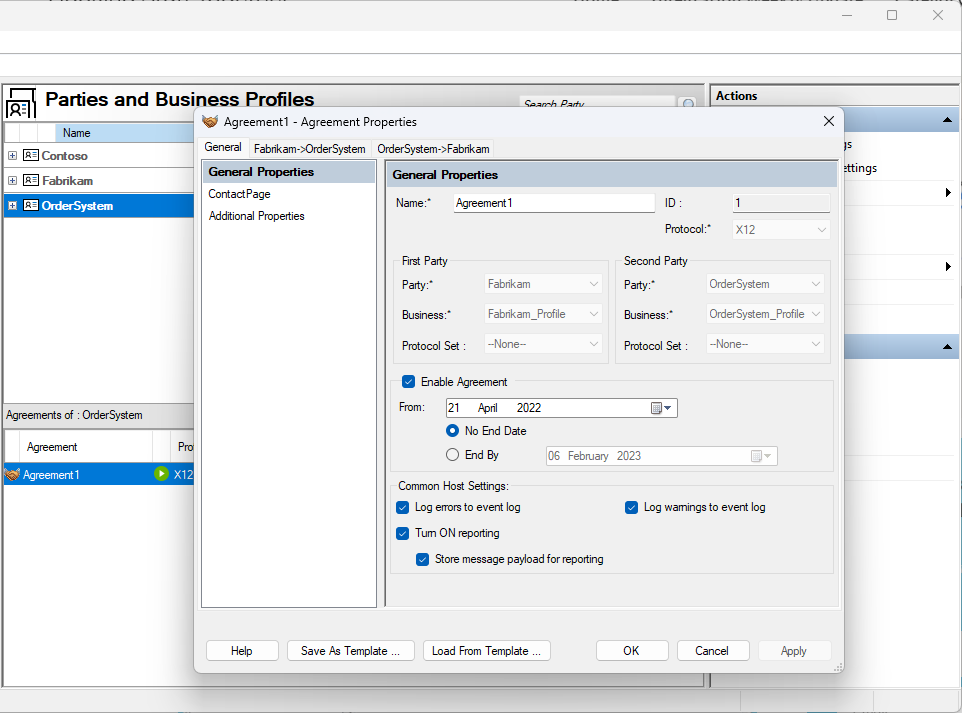
Microsoft’s BizTalk server is a mature server-side software for integrating dispersed systems or applications. It serves as a central point where firms can send messages for the intended client to receive in their preferred format.
To install BizTalk EDI components, you need to enable the “BizTalk EDI/AS2 Runtime“ feature in the BizTalk Server installation wizard. Also, enabling “Business Activity Monitoring” will help us to install EDI components and its application, BAM is specifically required for the EDI/AS2 Runtime Status Reporting feature since it is based on BAM.
During the configuration in the BizTalk Server configuration wizard, enable the EDI/AS2 runtime, it will help to create a default application “BizTalk EDI Application”. We can refer to making use of the Pipelines and Schemas in other Applications.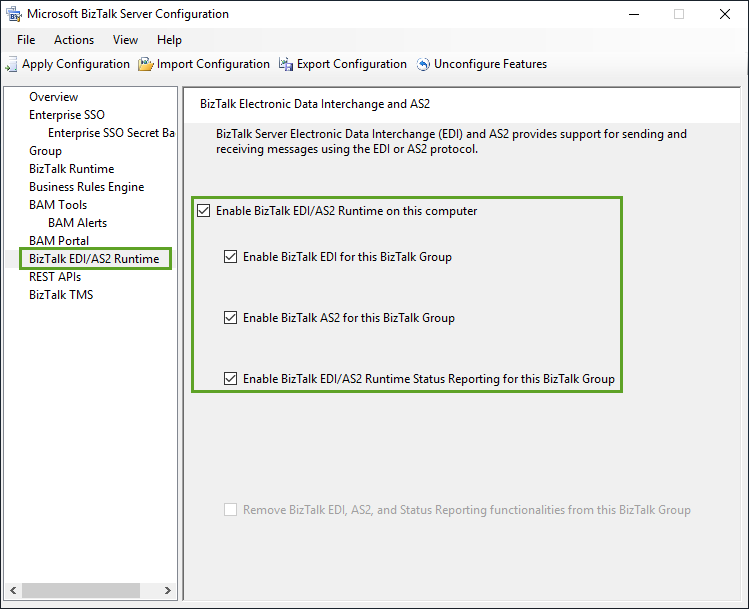

The primary purpose of many BizTalk implementations is to facilitate the exchange of EDI transactions with business partners. EDI deals with the header information not found in the actual message (Schema) but must be configured using Parties and Agreements. Many BizTalk professionals have little to no experience with EDI and struggle to comprehend some of the business rules that have an impact on mapping, making it a black box.
BizTalk360 tries to breach this black box behavior with its variety of features supporting the EDI transactions, which makes the BizTalk Server easy to understand and safe to work upon. With BizTalk360, users do not need to log in to the BizTalk admin console to manage their EDI operations. All the operations can be done from BizTalk360 itself, including the out of box capability to manage and monitor the EDI parties and agreements.
The EDI transaction data can easily be tracked using the following BizTalk360 features.
BizTalk360 allows administrators to view the status reports of EDI and AS2 transmissions. The status reports providing information on document exchange transactions, including acknowledgment information (if any). The reports also provide the status of pending and unacknowledged interchanges, completed interchanges, and other scenarios.
The EDI dashboard in BizTalk360 is primarily intended to make it simple to access various EDI properties within BizTalk360 “in a single click.” To do this, we prepared the widgets in BizTalk360 that we felt clients would use frequently on a daily basis and selected the important EDI characteristics. The data is presented in a clear and useful manner by BizTalk360 Dashboards, which were created with non-BizTalk users in mind. The EDI Reporting Dashboard is a widget-based dashboard, just like the other dashboards in BizTalk360. The EDI Dashboard is seen by those who have access to EDI Reports. This dashboard supports the addition of widgets from three different categories:

BizTalk includes an EDI Status reporting function that enables support staff to keep track of the status of associated EDI transactions, interchanges, and acknowledgments. These reports are available on the BizTalk Administration Console’s Group Hub page. All these reporting features are available in BizTalk360’s web console, and data monitoring features are added on top of that.
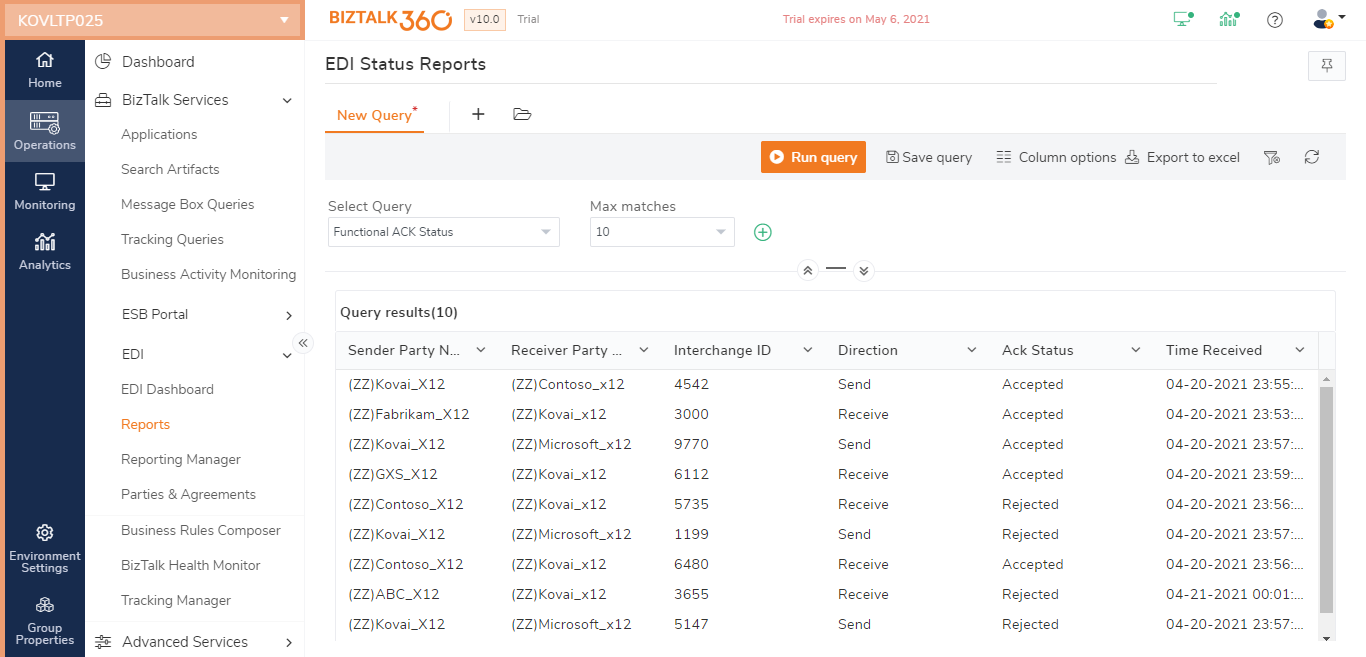
Administrators must monitor the interchange acknowledgment status, batch state, AS2/MDN status, transaction set details information, and other factors while working with EDI transactions. For example, you might need to quickly enable/disable reporting for each agreement using the EDI reporting manager. However, it takes a lot of work to complete this process via the BizTalk Admin Console, especially when there are numerous parties and agreements. The NRR configuration in BizTalk360 also allows for bulk enable/disable operations on the encoded messages and MDN for the corresponding agreements.

BizTalk360 has out-of-the-box capabilities to handle EDI transactions, one of which is the managing and monitoring of the EDI parties and agreements and the other is the EDI data monitoring. Apart from these features, we also have the EDI queries and dashboards available in BizTalk360 which are not available in the BizTalk admin console.
Trading Partner Management or TPM in BizTalk Server manages the party, profiles, and agreements. These entities are used in EDI message transactions. TPM is responsible for managing and preserving the information about partners(parties) and their business information(profiles). To avoid context switching between the admin console, BizTalk360 has added the capability to create and manage the EDI parties and agreements. Additional capabilities that are missing in the BizTalk admin console, which are incorporated in BizTalk360 are:
With role-based access, only the users who have the required access permissions can manage the parties. All the activities performed in BizTalk360 are captured and audited so administrators can always know who performed what action.
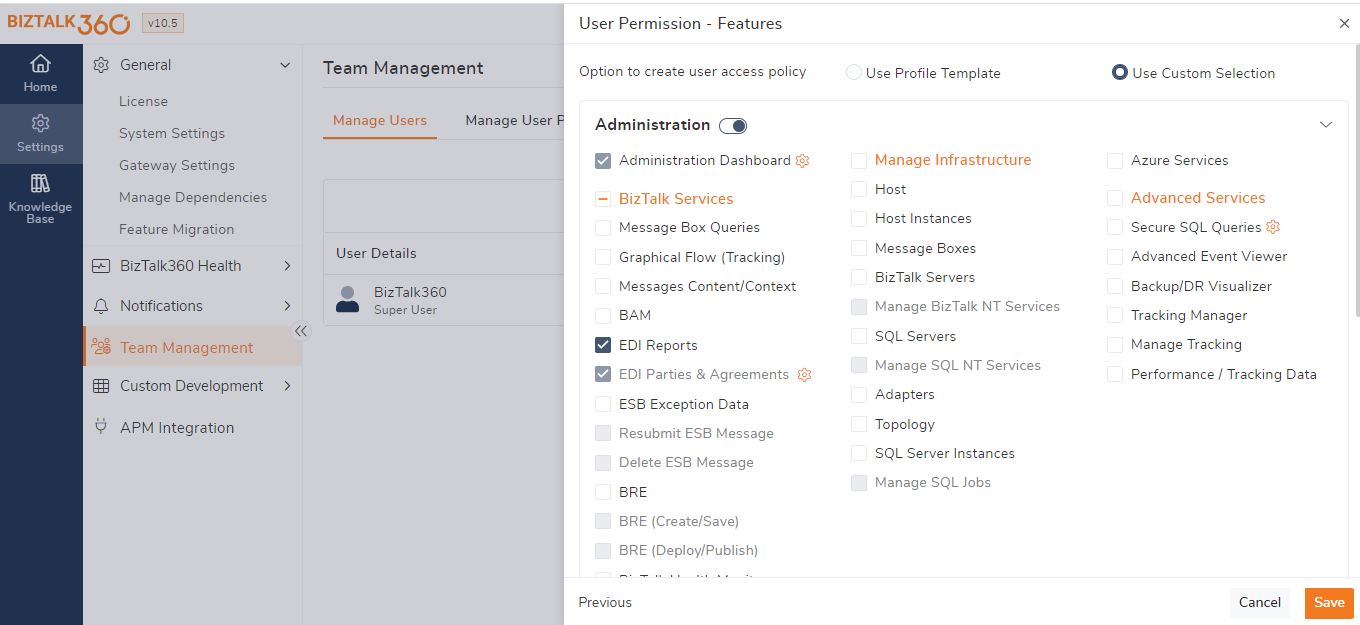
In BizTalk360, EDI Agreement monitoring is implemented in a secure and audited way. With this feature, you can monitor and get notified if the state of an agreement went down. Also, the system will AutoCorrect the state if it does not match the expected state.
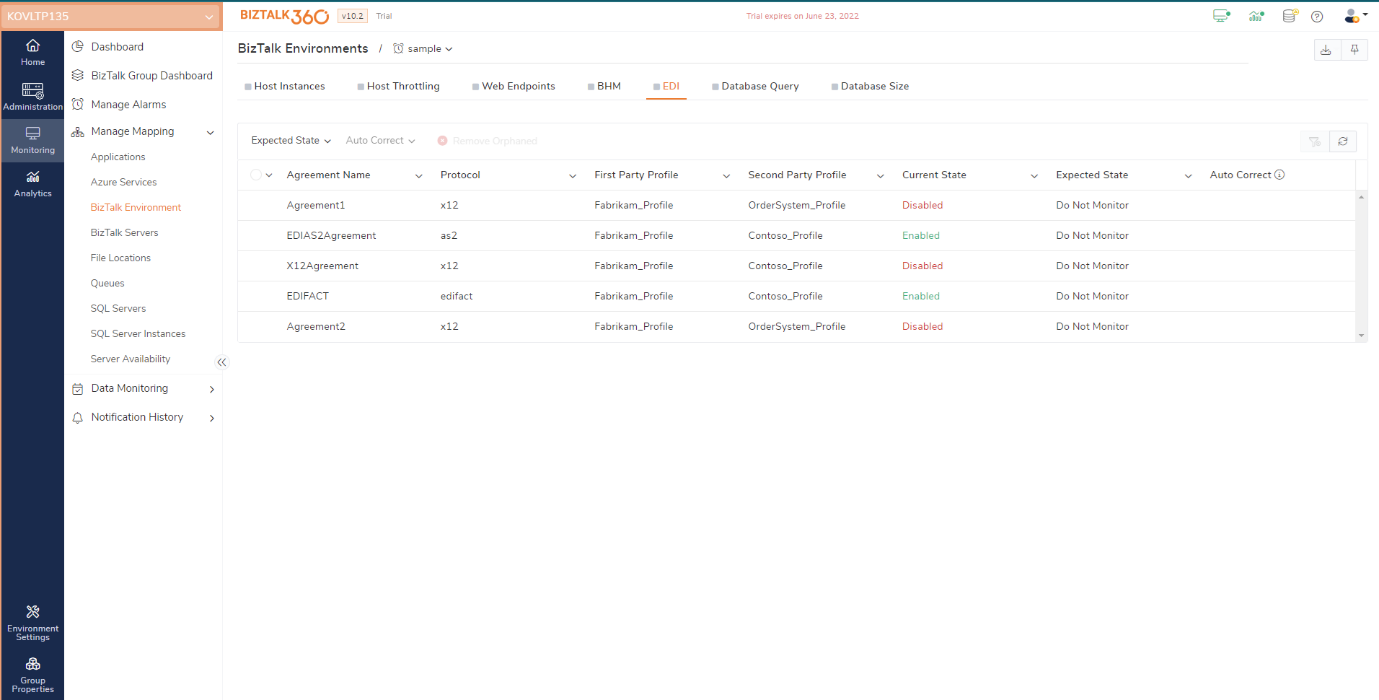
When it comes to EDI transactions through the system, administrators must watch the status of interchange acknowledgments, batch statuses, AS2/MDN statuses, and other such details associated with the transactions. To achieve this, administrators must query the status of each transaction manually in the BizTalk Server Administration Console. This is a monotonous task for the administrator. However, BizTalk360 helps administrators to reduce the time spent performing these monotonous tasks by offering EDI Data Monitoring capabilities.
For example, administrators can set up a Data Monitor as “Warn me when there are more than 15 Interchange/ACK Status and send an error notification when there are more than 20 Interchange/ACK status messages within an hour during the business day”. In this case, the Data Monitor will execute every hour from 9 AM to 6 PM to check for the number of Interchange/ACK status messages during the hour and throw the error/warning notifications to the administrators through the notification channels. This reduces the effort of the administrator to manually check the status of EDI reports regularly.
Having seen the advantages of the EDI functionality that is integrated with BizTalk360, why not give it a try with the latest version of BizTalk360 v10.5? This version includes many new features and enhancements as per the customer feedback shared. If you have any feedback or looking for any enhancement in a particular module, please feel free to put in your suggestions in the feedback portal.